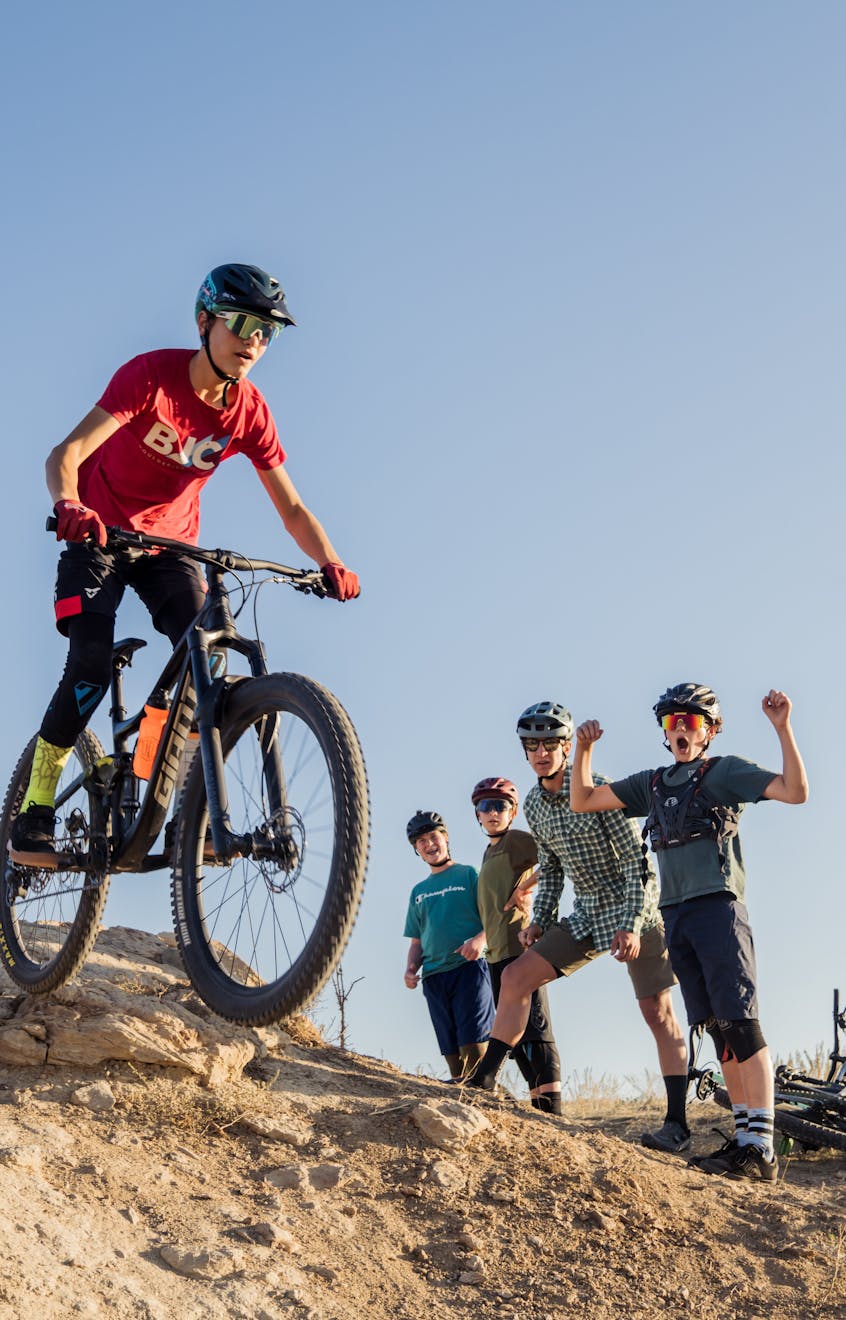A New Center Of Gravity
Words by Molly Herber | Photos by Natalie R Starr | 8 Min Read
For years, cyclist Garrett Gerchar measured progress in miles pedaled, hours on the bike and racing splits. On this sunny afternoon at the Boulder bike park, those metrics are far from his mind.
Photos by Natalie R Starr
On this sunny afternoon at the Boulder bike park, those metrics are far from his mind as he watches the middle schoolers he coaches practice their drops, jumps and turns.
As a coach, he has two rules: “Number one, if you're not having fun, you have to tell me. Number two, if you're not having fun, we have to change what we’re doing. Because what’s most important, before everything else, is having fun on your bike.”
Cycling has meant different things to Garrett throughout his career—racing tool, fitness aid—and while prioritizing fun hasn’t always been easy, recognizing the need for fun has been the most important part of sticking with the sport he loves.
“ If you are having fun, you have to tell me Number two, if you're not having fun, we have to change what we’re doing ”
Born and raised in Boulder, Colorado, Garrett devoted several years to pushing for a spot on a professional-level cycling team. From high school through college, his world revolved around training and competing for his college team and the Clif Bar team, both as a learner and as an Under 23 pro. Even after the Clif Bar team disbanded two years after graduating, he continued racing on the professional circuit independently.
This level of support and competition fed his competitive spirit and appreciation for the sport, as well as offering opportunities to travel both in the U.S. and abroad: “My experiences really ignited my passion for racing…cyclocross and mountain biking took me to all these cool mountain towns and cities around the US.”
But after two years, he hit a tipping point. “It didn’t click anymore.” Maintaining this level of performance took a huge commitment of time and energy: “In college I was always training, always racing. There was no real off-season for four years. And it was super fun, I don't regret it at all.”
But after racing independently, he was able to take a clear-eyed look at what it would mean to continue racing at this level—the training, the travel, the logistics. But it wasn’t about the discipline or training schedule; those things were fun. It was the way racing changed his relationship to cycling itself. He “didn’t want it to be just a fitness tool. Doing that isn't fulfilling me in the way it was in the past.”
So, he returned to Boulder—a place that always spoke to his heart even when he was traveling for competitions. “I haven’t yet found a reason to leave this beautiful place. It always seems to have something new to offer me.”
At the same time Garrett decided to shift gears and step back from racing, the Boulder Junior Cycling program needed new coaches. Garrett participated in the program as a young cyclist himself and looked forward to shifting his approach to cycling from being performance driven to being a coach and mentor.
“I grew up in the program, so I understand the kids wholeheartedly. The way they still see the bike as this fun thing rejuvenated me to keep riding and sparked my love for cycling again.”
Garrett coaches two different age and skillsets—Enduro programming that focuses on technical skills at bike parks and trails, and cyclocross, which is a more entry-level group focused on the fundamentals of cycling. “I was having a blast as a coach. I could see myself in these kids who wanted to be fast and wanted to have fun, and I can really bring a lot of skills to them, and they were willing to listen to me.”
After all, biking is something that many of us learn to do as kids, and it’s often our first way of traveling independently. There’s something inherently playful and liberating about spinning around corners or, if the infrastructure is in place, biking to a trailhead or the grocery store.
This sense of choice and freedom lies at the heart of Garrett’s work to break down the barriers to cycling. He goes beyond teaching cycling skills to thinking about simplifying his apparel and wearing clothing his participants will recognize, and lending out parts and giving spontaneous lessons to the people who need them.
“I want people to realize that you don't have to spend a million dollars on the right bike, the right clothes, the right shoes, the right helmet, the right thing. If you get the bike, you can do almost everything from there.”
In this way, coaching has been affirming for Garrett—a way to shift into something different and sustainable than competition without keeping the benefits, lessons and gifts that the time gave him to himself. He still participates in cycling events and doesn’t shy away from setting challenging goals, like returning to the grueling LeadBOAT event. But now it’s more the experience rather than the competition that drives his motivation.
Shifting gears to a new center of gravity, while it might seem like leaving something behind, has only added to the sport that Garrett always loved.
“Cycling is such a good sport because you can do it your entire life. There’s no time limit on riding your bike!”
Top Stories
Check out all the Top stories
Follow us @stio
See how people are living the mountain life everyday in our gear.


















